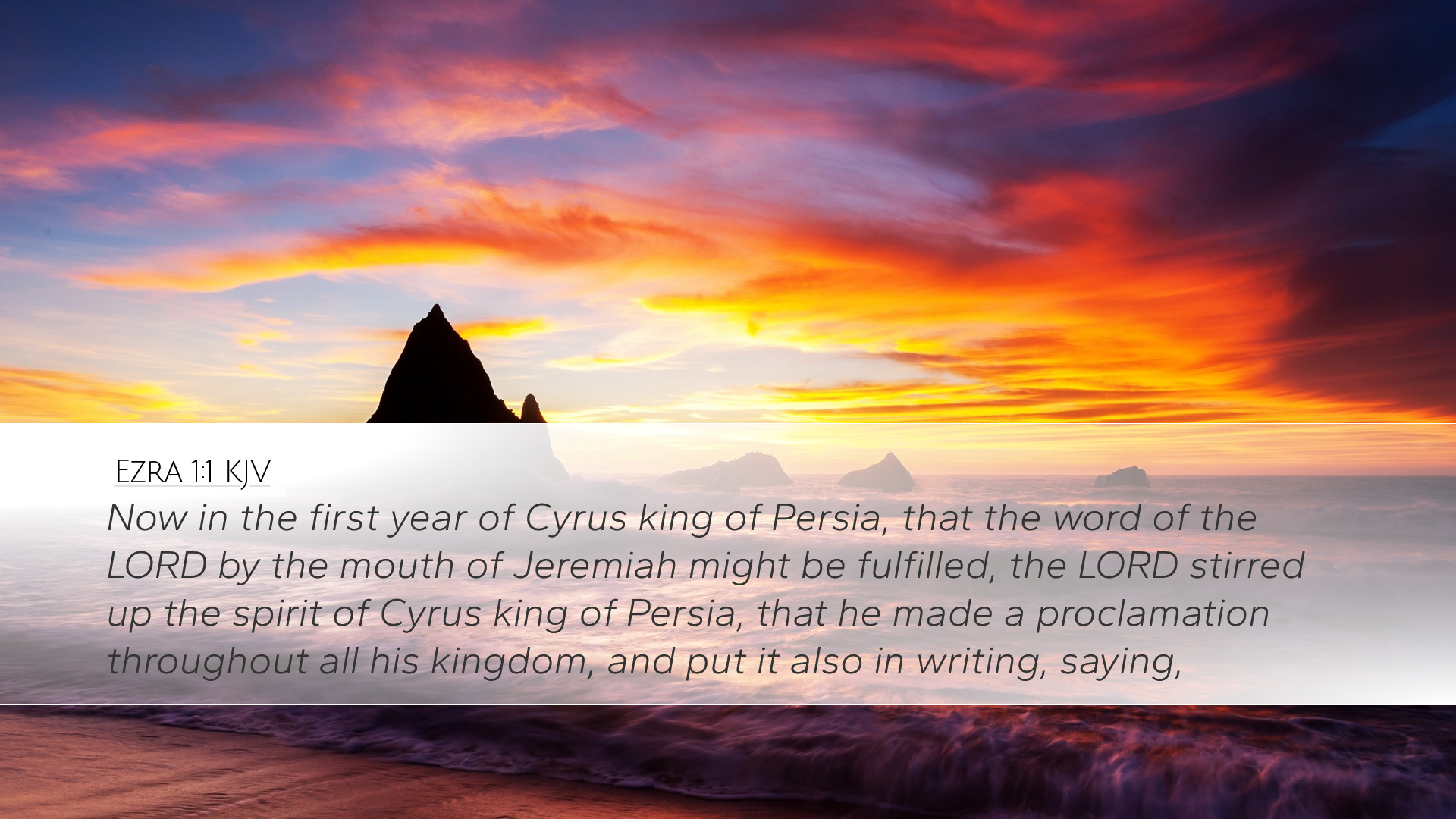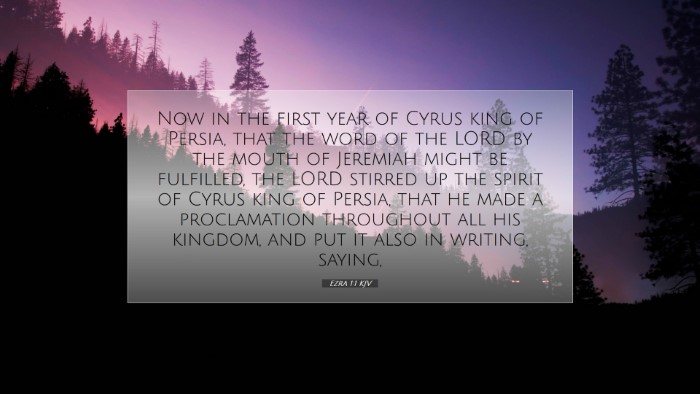Old Testament
Genesis Exodus Leviticus Numbers Deuteronomy Joshua Judges Ruth 1 Samuel 2 Samuel 1 Kings 2 Kings 1 Chronicles 2 Chronicles Ezra Nehemiah Esther Job Psalms Proverbs Ecclesiastes Song of Solomon Isaiah Jeremiah Lamentations Ezekiel Daniel Hosea Joel Amos Obadiah Jonah Micah Nahum Habakkuk Zephaniah Haggai Zechariah MalachiEzra 1:1
Ezra 1:1 KJV
Now in the first year of Cyrus king of Persia, that the word of the LORD by the mouth of Jeremiah might be fulfilled, the LORD stirred up the spirit of Cyrus king of Persia, that he made a proclamation throughout all his kingdom, and put it also in writing, saying,
Ezra 1:1 Bible Commentary
Commentary on Ezra 1:1
Introduction
Ezra 1:1 marks a significant moment in biblical history, where the decree of Cyrus allows the Israelites to return to Jerusalem and rebuild the temple. This verse is pivotal for understanding the restoration of God’s people after the Babylonian exile. In this commentary, we shall extract insights from notable public domain commentaries such as those by Matthew Henry, Albert Barnes, and Adam Clarke.
Text of Ezra 1:1
“Now in the first year of Cyrus king of Persia, that the word of the Lord by the mouth of Jeremiah might be fulfilled, the Lord stirred up the spirit of Cyrus king of Persia, that he made a proclamation throughout all his kingdom, and put it also in writing, saying,”
Historical Context
Understanding the historical background of Ezra 1:1 is vital for grasping its significance. After the Babylonian captivity, which lasted approximately 70 years, God’s promise to restore His people was coming to fruition. As prophesied by Jeremiah (Jeremiah 29:10), the Israelites were to return to their homeland. The role of Cyrus, a foreign ruler, in the restoration is profoundly noted by commentators.
Cyrus the Great
Matthew Henry mentions that Cyrus was not merely a king but was divinely appointed to fulfill God's purpose. His reign marks a transition not only in political power but in redemptive history. Albert Barnes emphasizes that Cyrus’ decree reflects God’s sovereignty over even the mightiest empires.
Divine Orchestration
The Word of the Lord
From the outset, the text highlights that the actions of Cyrus fulfill the word of the Lord spoken through Jeremiah. Adam Clarke notes that this serves as a reminder of God’s faithfulness to His promises. God’s timely intervention in stirring the heart of Cyrus illustrates the truth of Proverbs 21:1, where the king's heart is likened to streams of water in the hands of the Lord.
The Stirring of the Spirit
Henry and Barnes both shed light on the phrase “the Lord stirred up the spirit of Cyrus.” This stirring is a clear indication that divine influence was at work. Clarke notes that the Spirit of God can move even those who may not recognize Him, showcasing God’s ability to use anyone for His divine purposes.
The Proclamation of Cyrus
Cyrus’s proclamation, as illustrated in Ezra 1:1, is significant for several reasons:
- Legal Authority: His decision carries political weight, validating the return of the exiles.
- Public Confirmation: The decree was made known throughout the kingdom, showing it was not a secret undertaking but a public act of God's faithfulness.
- A Call to Action: It serves as a rallying point for the Israelites, encouraging them to return and rebuild.
Theological Implications
This verse reflects key theological themes such as:
- God’s Sovereignty: The narrative is rooted in the sovereignty of God who uses Cyrus, a Gentile king, to achieve His purposes.
- Fulfillment of Prophecy: The fulfillment of Jeremiah’s prophecy demonstrates that God is faithful and His word will accomplish what it intends.
- Redemption and Restoration: The return signifies a new beginning for the Israelites, emphasizing themes of redemption not only physically but also spiritually.
Application for Believers
The truths found in Ezra 1:1 offer profound insights for contemporary believers:
- Trust in God’s Timing: Just as God fulfilled His promises to Israel, He is faithful in our lives.
- Awareness of God’s Sovereignty: God can use unexpected people and circumstances to fulfill His plans.
- Responding to Divine Call: Like Cyrus’s call for the return, we are prompted to respond to God’s work in our lives and to actively participate in His mission.
Conclusion
Ezra 1:1 encapsulates a moment of profound significance in the history of Israel and serves as a reminder of God’s unfailing promise to restore His people. Through the insights of various public domain commentators, we see that this verse not only fulfills prophecy but also emphasizes God’s absolute sovereignty and the importance of trusting Him in the unfolding of His redemptive history. Believers today are called to recognize these elements and to be emboldened in their faith, knowing that God is at work even through the most unforeseen means.


